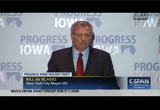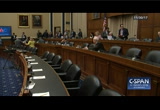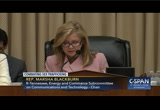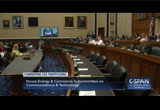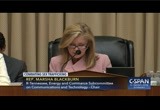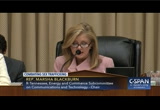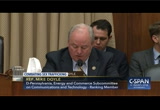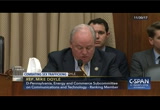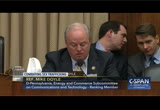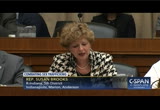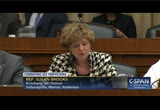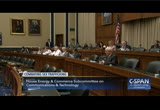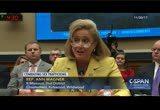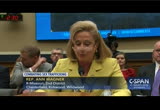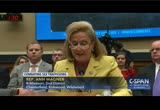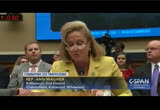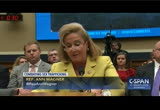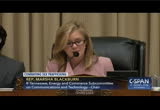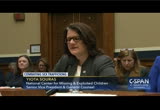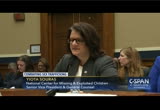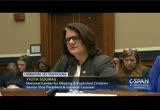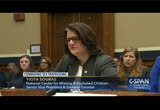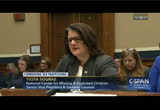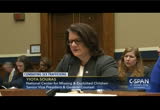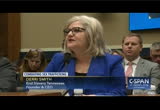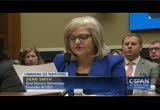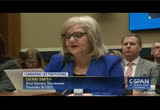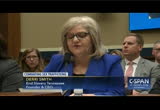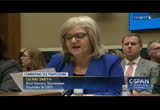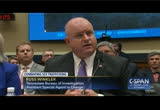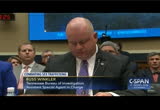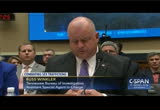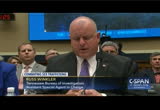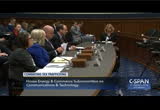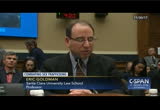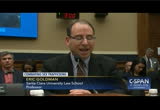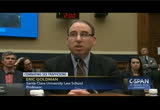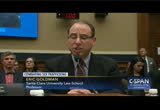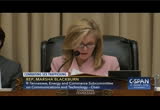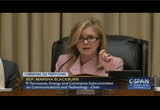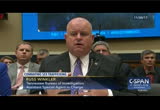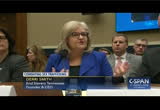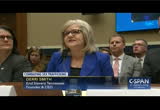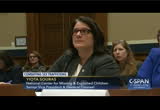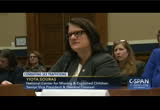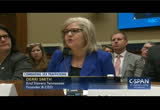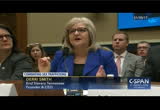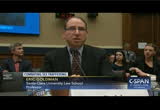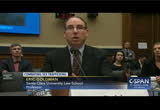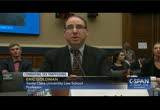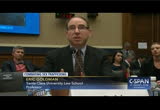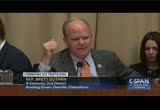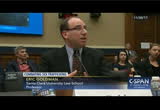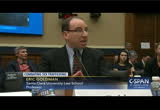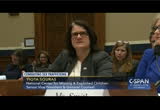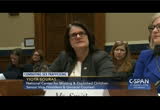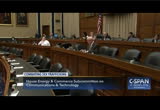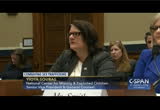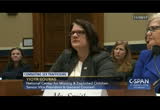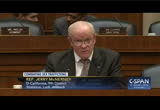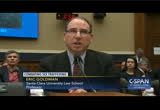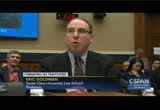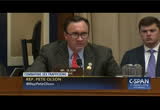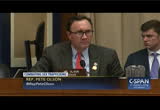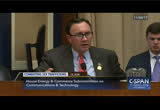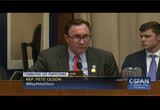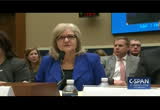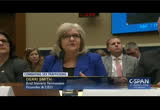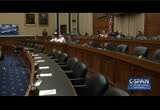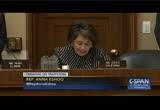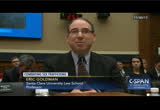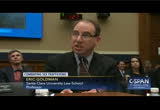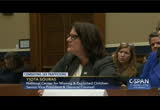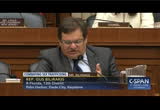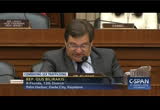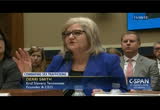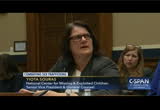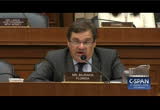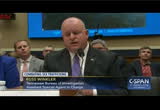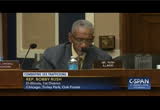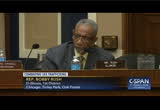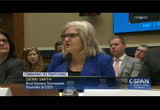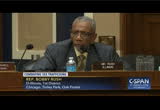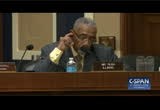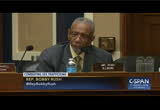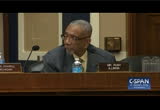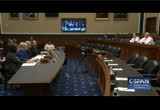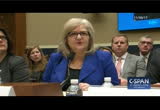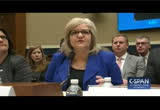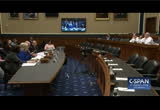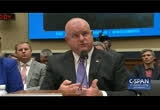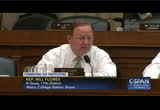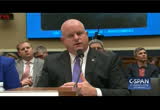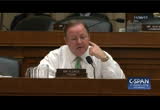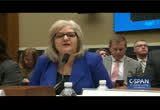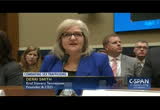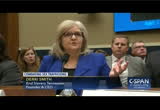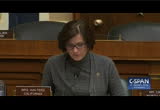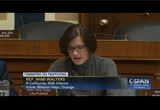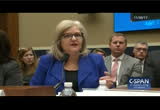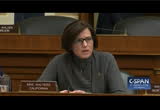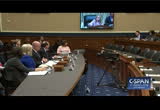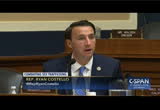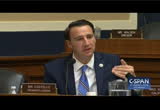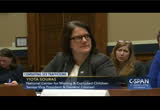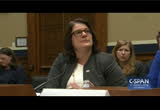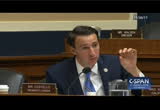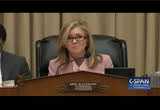tv Combating Sex Trafficking CSPAN December 26, 2017 5:04pm-7:00pm EST
5:04 pm
sure, the donors gave money. sure, the party came up with something that seemed maybe kind of like a message, and we lost. we were so desirous of the money that we created a vision and a message we could not win with. that is what happened for years and years. i don't want the money if the money is going to stand between us and the people. [applause] more of new york city mayor bill de blasio tonight at 8:00 p.m. eastern here on c-span. and tonight on c-span2, book tv is in prime time focusing on business and economics, including a nobel peace prize winning economist on his book "a world of three zeros." and on c-span3, american history tv with a look at the cold war, including discussions on the u.s. special forces in berlin
5:05 pm
and films from the era, including "the road to the wall." american history tv in prime time beginning at 8:00 p.m. eastern. hill, ar: on capitol house subcommittee held a hearing on fighting online sex trafficking and review the legislation that would allow the states and victims to sue websites. this is about an hour and 50 minutes.
5:07 pm
5:08 pm
unspeakable abuse. you share my outrage that this is happening in our backyard, and i cannot thank you enough for rescuing the victims, then helping them heal, while seeking justice for their abusers. you are doing a superlative job. for the fifth year in a row, tennessee received an a on his report card on the protective innocents challenge, a comprehensive study of existing state laws compiled by shared hope international. the challenge produces a state report card that rate how effectively each state responds to the crime of domestic minor sex trafficking. after four years of straight a's, tennessee outdid itself this year by leading the rankings, number one in the country. what a testimony to the partnership between tennessee
5:09 pm
law enforcement and victim advocates, that you have built and grown together over the years. we are honored that you are taking time away. the legislative debate this year has focused on amendments to section 230 of the communications decency act, which law enforcement has consistently identified as a barrier preventing effective prosecution of online entities that facilitate trafficking and adequate resource for trafficking victims. hearingorward to testimony about the efforts to find an effective approach to tackling and defeating this problem. she has been a tireless and passionate advocate, and i am proud to be a cosponsor of her bill. i would also like to welcome, and we look forward to hearing the concerns and perspective, of
5:10 pm
the others as we consider next steps. with so many women and children waiting on us and counting on us, doing nothing is not an option. at this time i yield back my time and i recognize mr. doyle for five minutes. thank you madam chair for holding this important hearing, and thank you to the witnesses for appearing before us today. human trafficking in all its forms, and in particular sexual trafficking of children and adults, is an abhorrent crime. thank the witnesses from antislavery tennessee, the national center for missing and exploited children, the tennessee bureau of investigation. this is hard work you all do, and i know it carries a heavy burden. for my part, i want to thank you or your efforts and the efforts of your organizations. be assured this is an issue of great concern to all of us. i also want to thank representative wagner for testifying before us today.
5:11 pm
i understand this is an issue you have been working on for the law yound that wrote is starting to be used to combat online sex trafficking. i also understand that in reference to the bill before us today, you are working with chairman goodlatte on an amendment in the nature of a substitute to your bill and i hope it will be marked up in the judiciary committee. i am hopeful you will be able to move your amended bill out of committee and before the full house for a vote. i also want to announce the good work being done by senators mccaskill and portman and the subcommittee on investigations. the investigation report they released is truly frightening. it alleges that back page knowingly facilitated child sex trafficking. i am deeply concerned about emails sent by moderators seeking to limit the number of a
5:12 pm
ds they were reporting on a monthly basis. they repeatedly altered and deleted words and phrases that would indicate sex trafficking without reporting to authorities. and according to this report, these were done for the express purpose of concealing the illegal nature of these activities. far as toent so deploy software that automatically deleted terms from ads before publication such as amber alert, rape, young, and fresh, apparently for the express purpose of concealing the true nature of the transactions occurring on the site. thateport goes on to say by their own internal estimates, ofy were anything 70% to 80% the ads in the adult section of the site. backpage would go on to start that contained
5:13 pm
these words, but with a pop-up explicit wording to advertisers to how they could get back around back page's , simply instructing users to change the posted age in order for the ad to be posted. to my mind, this report indicates a vast criminal enterprise. thatheartened by reports there are potentially multiple federal investigations using insights from the senate report and the panel grand jury. my hope is that justice can be done. madam chair, i thank you for this hearing and i yield back. >> ms. brooks, you are recognized. walden see if chairman makes it. >> thank you madam chairwoman. i am very pleased to see our colleague and a leader in the house of representatives, representative wagner, who has
5:14 pm
been a strong voice fighting for the victims and educating the american people about backpage and other avenues of sex trafficking. i just want to take a moment to commend the state of indiana. i was involved as united states attorney from 2001 to 2007. during that time, the bush administration put a huge focus on exportation and child exploitation. we started an effort called ipath, about protection against human trafficking. it brings together law enforcement, victim services, puts in place protocols, but i will tell you that the criminals and the perpetrators are always trying to stay one step ahead. they are always trying to find ways to exploit children, women, and others in order to satisfy their sexual desires.
5:15 pm
it is very difficult work. law enforcement work around the victims and the web's they have created and the perpetrators which coordinate are somethingld that we must continue to pursue with every avenue we possibly can. the victims, and finally i want , thecus on the victims victims of this type of sexual exploitation and trafficking can be found in every district in our country, from urban areas to roll -- to rural to suburban. i think people are often shocked when they read about the victims , and we must make sure we are there for the victims. i just want to commend and wagner andommend ann so many members on both sides of the aisle who have led the charge to say that we cannot allow this type of human slavery
5:16 pm
in this day and age to continue, and we must continue to fight it. i just want to thank my colleague from misery -- from missouri for being a leader. >> is there any other member seeking recognition? no other members seeking recognition, the gentlelady yields back. at this time i want to recognize mr. cologne -- mr. pollone, who is not here. mr. doyle. >> i forgot to enter into the record a letter yourself -- to yourself and myself. >> was that objection, so ordered. at this point, our first witness for today's panel will include ms. and wagner -- ms. ann wagner, who will give opening were go -- opening remarks on the issue.
5:17 pm
you forner: thank hosting this committee hearing today and for allowing me to get some opening remarks. i appreciate your commitment to addressing online trafficking and especially appreciate that so many members of the subcommittee have publicly 1865, stopping- the victimization of american children and adults online. it is my top priority in congress, and i know i have an ally in chairman blackburn. appreciate other cosponsors of my bill. my first major piece of legislation concerning online trafficking was the save act, which became law in 2015. it was the first step in addressing federal level prosecution of websites. unfortunately it has not yet
5:18 pm
--n used, presumably because moreover, the act was federally focused and did not enable states and local prosecutors to protect their communities. since then,ed a lot and this is why over a year and a half ago i began working on hr 1865 to allow states and victims to fight online sex trafficking act. is written for victims, not only because it would allow victims to pursue civil justice, but because it would empower local prosecutors to take down websites that facilitate trafficking before they ever reach the size or scope of backpage.com. the house understands that enabling vigorous criminal
5:19 pm
is not just important, but mandatory in any legislation we pass. this is why over 170 of my billagues cosponsored the when i personally explained to them how websites can perpetuate modern-day slavery with impunity. why are these websites able to sell our children? because judges have ruled that section 230 prevents websites that exploit the most vulnerable members of our society from being held accountable. response to these rulings must be patently clear. the act was never intended to allow businesses to commit crimes online that they could never commit off-line. when congress passed the communications decency act in 1996, it explicitly acted to prevent the internet from becoming a red light district, and it clearly did not believe e was a prerequisite
5:20 pm
of a free and open internet. what congress cannot do is pass a bill that a man's death that amends -- that amends section 230 lb so narrow that it only prosecutes backpage.com. i appreciate the complicated legal environment we are operating in, and i believe it is a step in the right direction. but the senate bill is not the full solution. is currently the largest of the websites that facilitates trafficking in america, but it is already under federal investigation, and it is of thismall piece growing criminal ecosystem. advertising sites
5:21 pm
have jumped into the marketplace of illegal sex. serves at theeros high-end market. escorts in college serves under , and massagensent troll is sadly popular in my own district. this has been discovered over the past year. while it may now be possible, though incredibly difficult to prove that backpage.com knowingly assisted in sex trafficking, it is not possible to gather this level of evidence for the hundreds of other websites that are profiting from the sex trade. i have spoken with prosecutors across the country who have asked the house to pass a practical solution that will allow them to take predatory websites off the internet, and i am repeatedly told that any legislation that depends exclusively on this standard is merely a washington, d.c.
5:22 pm
feel-good exercise. -- might cap itself on the back, but will have a published little -- accomplished little. this bill is centered on the reckless disregard standard that prosecutors need to open cases on these websites, and we must find a way to maintain a useful standard, or at least not raise the high bars that victims and prosecutors must already meet. if we are serious about helping victims, we must create laws that allow for a robust state and local criminal enforcement. criminal enforcement means businesses will stay out of it illegal sex trade. fewer people will ever become victims, demand will be reduced, and yes, civil suits will be easier to bring. the criminals who auction our
5:23 pm
children will be put behind bars. i believe, in closing, we can mark up a bipartisan house bill that will provide meaningful tools to prevent future victimization, and i look forward to working with you to pass a forward facing solution that will disrupt the online trafficking industry. i thank you madam chair, and i think you all in the committee and my colleagues for allowing me to give these opening remarks. blackburn: the gentlelady yields back. we thank you so much for your remarks and your well wishes that we will move forward. at this time we will briefly recess, long enough to put the new nameplates up, and will welcome our panel to the table.
5:24 pm
at this time we welcome our second panel witnesses. the senior vp and general counsel for the national center for missing and exploited ceo of in slavery tennessee, assistant special agent in charge at the tennessee bureau of investigation, and a professor at santa clara university school of law. welcome to each of you. we appreciate that you are here today. we are going to begin our testimony with you. each of you will have five
5:25 pm
minutes. i ask that you move the microphone to you, catch the button in the center so that you activate it, and at the end of your five minutes, we will begin the questioning portion of this hearing. you are recognized for five minutes. >> thank you. chairman blackburn, ranking member doyle, and makers of the committee, i am honored to be your today to join this discussion to ensure that america's most vulnerable victims, children trafficked sexualfor rape and abuse, have opportunities for justice against their traffickers, including those who participate in trafficking them online. i would like to thank congresswoman wagner for her long-standing dedication to child sex trafficking victims and her tireless work to create meaningful change for these survivors. as part of our work as a
5:26 pm
congressionally designated resource center on missing and exploited children, we see approximately 9800 reports of child sex trafficking every year. over the past five years, 88% of these reports have involved a child being trafficked online. more than 74 of these reports from the public relate to an ad on backpage. we have learned and an onerous amount about the complexity, ruthlessness, and profitability of the sale of children for sex online, but we have also seen torts struggle and failed hold websites liable for facilitating sex trafficking. today we are at a crossroads on how best to proceed with legislation that combats this heinous crime. courts have been unable to find their way around the current application of the cda, a statute that is over 21 years old and has created broad
5:27 pm
immunity, even for websites that support online child sex trafficking. these courts have called on congress to clarify that all facilitators of online sex trafficking, including websites, are not legally protected. the house of representatives and the senate have worked on parallel tracks to develop bills that responded to the recent court decisions and reconcile the cda with protections granted to victims under the federal trafficking statute. we believe these bills address the specific legal barriers faced by child sex trafficking victims and coalesce around three legislative solutions. first, ensuring that state attorneys general have the authority to protect children and their own states and can bring criminal and civil actions against online entities that participate in sex trafficking. second, clarifying the sex trafficking victims can pursue civil remedies against everyone who participates in their
5:28 pm
trafficking, including websites. and third, defining participation in a trafficking venture under federal law as assisting, supporting, or facilitating sex trafficking. these broad legislative --utions, specifically solutions specifically respond on what courts have called congress to do, provide children with access to justice and hold websites that facilitates extravagant as possible. we have assisted tens of thousands of children victimized by online sex trafficking. behind the current debate about the particular details and standards within the legislative proposals are horrific experiences suffered by these children who are defenseless against predators selling them for rape and sexual abuse online. we have worked closely with many sex trafficking victims whose cases have been dismissed due to the current wrought interpretation of the cda's immunity.
5:29 pm
we have witnessed in the anguish of these children's recovery and have heard their hopelessness when courts dismiss their cases against websites that facilitated their trafficking. victims who have been denied justice due to the cda include a 14-year-old girl who was trafficked online for two years and advertised in sexually explicit poses. two 15-year-old girls, one who whileped over 1000 times traffic online for just over the , and one whoa year 15 customersive to a day. withrgency to move forward legislation that addresses past cases and has broad support from all key stakeholders, including -- stakeholders -- including
5:30 pm
will provide powerful tools to ensure the rights of victims while protecting current law that encourages a robust internet. we couldn't agree with you more when you say that standing by idly is simply not an option. it is time we hold companies accountable for their actions when they crossed the line. we have been encouraged by the senate's legislative process, including the support of the internet association and facebook and are hopeful under your leadership a similar path forward can be accomplished here in the house. in conclusion, we stand ready to assist the committee so that at the end of the day a bill can move expeditiously to the president's desk for enactment into law. thank you. mrs. blackburn: the gentlelady yields back. ms. smith, you're recognized for five minutes. ms. smith: thank you for holding the hearing on this important topic. it's an honor to offer testimony on the impact of
5:31 pm
technology on human trafficking victims and survivors. the sexual exploitation perpetrated against women, men, boys and girls in the commercial sex industry is found all across the internet. there's no place for a survivor of human trafficking to hide because their victimization is already on display for all to see. the public victimization exponentially complicates the healing process. in the early days of this work i met two girls from atlanta. they were deceived by a girl they thought was their friend driven to nashville by their trafficker. the trafficker got a hotel room, popped an ad online and was in business within half an hour. i was struck how easy it was for him to sell those girls. as easy as advertising a bicycle or car for sale. i was also struck how quickly men arranged to have sex with these young people as fast as
5:32 pm
ordering a pizza. in my years since i heard hundreds of variations of this story. at least three out of four of the survivors we served were advertised online and others were recruited and groomed online. thankfully an undercover detective was hong online ads that day posing as a john. he came to the girls' room and ended their exploitation within days of its start. they were the lucky ones. once recovered, survivors still face threats from predators online who are waiting for them to surface. especially in the early days of survivor recovery, our efforts to monitor online activity are more challenging than simply monitoring phone usage. there are temptations, dangers and master manipulators ready to entice survivors back into exploitation. when the tennessee bureau of investigation began proactively attacking human trafficking, they called end slavery
5:33 pm
tennessee for assistance. first, they wanted to understand the technology landscape and how it affected victims. how were victims recruited, bought and sold across the internet. they needed firsthand information, and one of our young survivors was willing to tell them how she knew about being trafficked online. secondly, the t.b.i. wanted a more direct partnership during the undercover operations. that meant our survivor intervention specialist and case manager were on site during the operation. when c.b.i. identified a victim she met with end slavery tennessee staff. they were offered service and a way out of exploitation that very day. some took the offer. others did not. but they did understand that the offer did not have an expiration date. the goal was to turn that scary and often negative interaction with law enforcement into one of hope. once a survivor comes to end slavery tennessee, the plan of care often depends on drug
5:34 pm
addiction, prior victimization, length of time enslaved and the age of the victim. we provided care and services to survivors from the age of 4 to 52, with the primary focus on minors through age 25 and in eight languages. in the fast five years we've gone from operating out of one 10 by 10 office to a small suite of offices and now to a care center and three safe houses. we currently care for about 190 survivors a year in nashville, and the surrounding area. survivors need a plethora of wrap-around services to meet their every need. because trafficking victims suffer complex posttraumatic stress disorder, the restorative process can and usually does take years. to compound the trauma of trafficking, most victims were abused as children or suffer from a range of other adverse childhood experiences that made them vulnerable to exploitation
5:35 pm
in the first place. it's essential that an agency offer case management and a array of services until a survivor is ready to lead a productive and stable life. in tennessee we use a single point of entry model with one agency in each of the four regions of the state whose entire focus is on providing intensive case management and restoration of victims. together we form the tennessee anti-slavery alliance. this approach ensures that quality, consistent trauma informed services are provided statewide in the most effective and efficient way possible and that victims don't fall between the cracks. thank you for this opportunity to address the committee, and i will welcome your questions later. mrs. blackburn: mr. wingler, you're recognized for five minutes. mr. winkler: thank you for inviting me today.
5:36 pm
i'm special agent in charge with the tennessee bureau of investigation and co-director of the tennessee fusion center. one of my responsibilities is to oversee human sex trafficking and investigations. since 2011, thanks to our general assembly, our governor and my boss mark wynn, we have been given better tools to combat this disgusting pride. we're proud that tennessee ranked number one on the report card and that's in due large part to our sustained focus of our state leadership. as i sit here talking with you i am overseeing 66 human sex trafficking investigations with minor victims in big cities and small towns across tennessee. in most of these cases, a sex trafficking perpetrator takes a child and forces, threatens or coerces her. the victim is nearly always female, to engage in sex acts for money. in our experience, most cases
5:37 pm
involving the posting of ads for underage sex on backpage.com but backpage is not the only site. identify people seeking to engage in commercial sex acts with underage females, we use young appearing female law enforcement officers to post ads online offering sex acts. we see these ads with terms like new to town that are code in that environment for underage females. the undercover agents establish they are under 18 and phone and text conversations with potential johns all have been men so far in our investigation. numerous men are not deterred by their juvenile status and eventually show up at the hotels where we set up encounters with undercover agents. agents meet with the men in a hotel room and engage in conversation that proves that offenders think they are under age. money is given to the undercover agents and the men
5:38 pm
are promptly approached by uniformed law enforcement officers who are waiting in the next room. for us this is unfortunately a routine operation. the demand is staggering and we know we are not unique among states. our most recent undercover operation in nashville suburb resulted in 21 men and apprehended over a three-day period when they came to a low tell room to engage in sex acts with undercover female agents who they believed were juveniles. the target traffickers of underage girls we use male undercover t.b.i. agents posing as johns. our undercovers respond to advertisements that our fusion center intelligence agents find on backpage.com. they use software called spotlight to help identify ads of a strong likelihood of being minors. rescuing victims of human sex trafficking is a priority for us. we have established strong
5:39 pm
cooperative relationships with nonprofit organizations in our state child protective services agency. the nonprofit organization end slavery tennessee is sometimes on site during our operations. they offer services immediately on scene to women who come to the hotels answering backpage ads. we've conducted operations and investigations involving numerous perpetrators and victims. the one constant we encounter in our investigation is the use of online platforms like backpage.com by buyers and sellers of underage sex. before i close i want to point out that human sex trafficking cases offer another example of a crime that enabled through communications technologies, victims are marketed on sites like backpage.com and traffickers and johns often use anonymous smartphone applications to facilitate and hide their negotiations over these children. this creates unique law enforcement challenges which
5:40 pm
are sometimes referred to as going dark challenges. while we need tools to discourage online platforms from facilitating commerce in children, it is clear we also need a legal framework that ensures law enforcement can get additional evidence we need to investigate these horrible crimes. i appreciate the invitation to testify today and look forward to your questions. mrs. blackburn: the gentleman yields back. mr. goldman, you're recognized for five minutes. mr. goldman: thank you. chairman blackburn, ranking member doyle and members of the subcommittee, i applaud the efforts of congress and this subcommittee to combat the horrible crime of sex trafficking. these efforts include the allow states and victims to fight online sex trafficking act of 2017, and i defer to experts in the sex trafficking advocacy community whether this would help victims. based on my expertise in internet law, i'll discuss fosta implications for the law
5:41 pm
that says that congress enacted in 1996 that says websites aren't liable for third party content. section 230 ranks as congress' -- one of congress' most important policy achievements in the last quarter century. section 230 touches deeply each of our lives by enabling the internet services we rely upon every waking hour. it also advances free speech by helping ordinary people communicate with the global audience for the first time in history. furthermore, section 230 improves marketplace efficiency across our entire economy and reduces entry barriers so new and innovative online services can keep emerging. section 230 is a global unique policy. no other country provides such strong protections for online publishers of third party content. this differentiation gives the united states a global competitive advantage for such services which has helped create enormous social value here in the united states. congress enacts section 230 in
5:42 pm
response to a 1995 ruling that an online service could be liable for user content because it had removed other objectionable content. the ruling created the dilemma for all online services that moderate user content. online services had to choose between two strategies. one, exercise full editorial control over user content and accept liability for whatever legally problematic content they miss, or, two, minimize potential liability by exercising no editorial control over user content. some services can't afford to exercise full editorial control. other services such as tools for real-time communications can't function with full editorial control. thus, failing to moderate content perfectly leads to liability, some online services will abandon efforts to moderate user content or even shut down. section 230 eliminated this moderator's dilemma. section 230 applies regardless what online services do to
5:43 pm
moderate content or even what they know about user content. this means online services can deploy and experiment with a wide range of content moderation techniques without fearing liability for what they miss. this helps online services but it also helps people access publication tools that let them reach new audiences. fosta would reinstate the moderator's dilemma. for the first time in two decades, it would have them question whether they should moderate content. some say it's too risky to do so. if it reduces or eliminates their moderation efforts, fosta may cause a net increase in sex trafficking promotion and all other types of anti-social content. section 230 does not give a free pass to online services to sell sex trafficking. section 230 does not limit federal prosecutions and the department of justice has prosecuted online services for publishing third party ads, including two -- at least two
5:44 pm
prosecutions against services redbook that facilitated online prostitution. furthermore in the 2015 save act congress criminalized online sex trafficking and a phoenix grand jury has been investigating backpage. congress can balance additional anti-sex trafficking initiatives with section 230's benefits by, one, ensuring that online services face a single standard liability rather than state-by-state investigations that allows them to determine what law applies to them. two, encouraging online services to continue performing content moderation efforts by facing liability on an online service's intent to facile illegal activities, not on what it knows, and expressly saying online services should not be legally penalize for their moderation efforts. i oppose fosta because it does not conform to either
5:45 pm
principles. thank you for the opportunity to address the subcommittee on this very important matter. mrs. blackburn: thank you, mr. goldman. the gentleman yields back. that concludes our testimony. at this time i have several documents to enter for the record. shared hope international exodus cry, the national center on sexual exploitation, and the coalition against trafficking in women, submit a statement. we have a letter from shared hope international, an article from "the registered guard," and a letter written april 3, 2012, that mrs. maloney and i did to google. questioning backpage. so we've been working on this for quite a while. and then a letter submitted in testimony from mr. chris cox, partner for morgan lewis, and he's the outside counsel for
5:46 pm
net choice. without objection, so ordered. so let's begin our questions. and mr. wirningler, i want to come to -- winkler, i want to come to you to begin. you referenced the sting that you had conducted and we all know that this made headlines of course in tennessee but also around the country. and we've looked at how tennessee is number one in shared hope international's study. and what i'd like to hear from you -- and i think everyone on this panel, democrat and republican, would like to hear from you. what do you think has made the difference in tennessee? what do you use most within the law? what would you like to see changed? the partnership, ms. smith, you may want to weigh in on this, but you're doing something different. you're getting results. i'd like for you to begin, mr.
5:47 pm
winkler, and then ms. smith, for you to add to his answer. mr. winkler: yes, chairwoman. i think the continued commitment by the general assembly and the governor and the t.b.i. director to support human trafficking investigations and our partnerships across the state with a nonprofit organizations and our partnership with our state, child protective services agency, all those things combined have been a tremendous help in tennessee. a lot of emphasis has been placed on enhancements in the law to make it more punishable for both buyers and sellers of sex acts with juveniles, and i think all those things combined is what has really helped us in tennessee combat this problem. mrs. blackburn: ok. ms. smith. ms. smith: i agree.
5:48 pm
i think it takes all parts of the puzzle working together. so you have to have law enforcement, legislature, the courts, child protective services, and service providers all working together communicating and collaborating together. i think that's something we do very well. law enforcement does work we can't do -- investigate, prosecute the person operators, rescue. we can bring a survivor and an advocate perspective so they can work in a trauma-informed way. we can bring survivors on the scene at those stings to build trust and transfer that trust to law enforcement, so they are likely to cooperate. if you don't have services in place for the victims, they're not going to stick around to make a good case. so everything intersects together. mrs. blackburn: let me ask you this. how are you all working and educating health care professionals? ms. smith: we are right now working with one of the large hospital systems. they have been working with us
5:49 pm
for about a year to create training for all of their staff nationwide. we are doing a beta rollout now in our region to train everybody from e.r. staff to the receptionicses at clinics. we have a proowe call in place so they have a trauma-informed response so they know to call the hotline number. they know the protocol for service provision for mandatory reporting. in our case, we bring survivors on the scene from our staff to be there immediately to build their trust and to offer them services. mrs. blackburn: ok. i want to go to you, ms. souras, and you, ms. smith, i did some reading in preparation for the hearing and looking at who is kind of the target victim for this. many times it seems it is young girls who are in state or foster care custody, if you will. i would like for you -- we'll begin with you, ms. souras, and
5:50 pm
then you, ms. smith, to just talk about how these perpetrators of the crime go about targeting these victims and then add if there's anything you think we could do differently? ms. souras: absolutely. thank you, chairman blackburn. you're absolutely right that the location of the child often has great bearing on whether they are more vulnerable to being exploited. ncmec views this as a missing child problem. as an example just last year in 2016, one out of six runaways reported to us were likely sex trafficking victims. of those 86% were running from state care. so definite correlations between children who are running away and also where they're running away from and, again, their ultimate vulnerabilities. in our experience the average victim is a girl even though there are boys and lbgtq youth
5:51 pm
who are trafficked as well but an average victim is a girl about 15 1/2 years old, between 15 and 17 is the general age range we see and typically these are children who are poovering be -- experiencing things. we often talk about children who are seeking really human basic requirements, safety, security, shelter. these are children who are not receiving that in their current home or social services setting. so they're very susceptible to promises, promises of love, shelter, again, security, very basic needs. and that really is how they're lured. these are children who are, you know, often seeking just the smallest remnant of kindness from someone. so that small extension of that
5:52 pm
from a trafficker and traffickers know who to extend that to and what that child might be looking for. that's often enough just, again, for them to feel like someone has something kind to them. mrs. blackburn: ms. smith. ms. smith: i ditto that 100% and i'll say foster care and the state custody system is a perfect pool for exploitation because you have those children who are vulnerable and we know lots of girls who are actually recruited within the system out of group homes. there would be somebody recruiting on behalf of a trafficker. it's a system that sets things up for exploitation because these girls learn, oh, i have a family who gets paid to take care of me. that kind of mentality can transfer to a trafficker. well, he's going to take care of me. it's reasonable that he's getting money to do so.
5:53 pm
and i think i would add, though, there is such a thing with familial trafficking. there are family members who traffic their children for money for drugs, usually, or for alcohol. and so in that state system when we're dealing with child services, there needs to be a track that's identifying those children and that's giving them the kind of specialized care they need. they can't be lumped in with the trueants and runaways and unruly children. there needs to be somewhere to get them to the services they need. mrs. blackburn: my time has expired. at this time i yield to mr. doyle for five minutes. mr. doyle: thank you, madam chair. mr. goldman, you mentioned two ways congress can achieve a balanced solution. first by avoiding a patchwork of state laws, which websites would have to comply. and then secondly, by targeting a website's intent to
5:54 pm
facilitate illegal activities. i wonder if you've seen mr. goodlatte's amendment to mrs. wagner's legislation that involves targeting the facilitation of prostitution with a specific intent standard and carving out state criminal laws that would do the same thing? would such a proposal, serve that purpose of balance -- proposal serve that purpose of balance? mr. goldman: i have seen that legislation and i think the effort to focus on specific intent to facilitate prostitution is a productive way of approaching the issue. i consider it to be superior than the alternatives i have seen. mr. doyle: you know, i want to again applaud the good work of the senate permanent subcommittee on investigations because they're bringing the details of this issue into focus. after reading their staff report it's clear backpage.com not only profited from online sex trafficking but that backpage.com also helped to develop content for online sex
5:55 pm
traffickers. professionor goldman, it's my -- professor goldman, it's my understanding section 230 does not protect the website when it develops content in this way. could you explain for us where the courts have drawn the line between developing content which is not protected and allowing third party posts which is? mr. goldman: the statute excludes anyone -- it's protection for anyone who creates or develops content in whole or in part. someone who develops content in part is not covered by the statute per its terms. in my opinion, the courts have interpreted that to really say that the party doesn't qualify for the section 230 if they develop what is illegal about the content and so there's a nexus between developing the content and developing what made it illegal and i think that's a helpful guidance for us to think about. mr. doyle: so the facts that were laid out in the senate
5:56 pm
report were true, do you think backpage.com can continue to use section 230 as a shield? mr. goldman: i will not say the facts have raised a lot of questions about exactly how we interpret the statutory language and i'm eager to see what the courts end up doing with the facts that they have. certainly in backpage's case we have a lot of suspicious about the legitimacy of their motives but some of what they were doing are common tactics on the internet and we need to make sure whatever happens to backpage doesn't also create problems for the other sites that might be doing similar things but with much less pernicious objective. mr. doyle: tell me about -- mrs. wagner's act was recently passed into law and what tools gives law enforcement in pursuing sites like backpage and how prosecutors and their investigators are starting to utilize it in their investigation and maybe you and mr. winkler can respond to
5:57 pm
that. mr. goldman: it criminalized knowingly advertised sex trafficking and that is a new crime that did not exist so it did cover some new area that had not been covered by any other crime. that law was just passed in 2015. i don't know what the typical turn-around time is for crimes and actual usage of that. it's very early in the development of that particular law to gauge whether or not it's been effective. we do know there is a grand jury investigation that has been investigating backpage in phoenix. we don't know what's going on in the grand jury investigation because that's a black box to us. it takes place under the cloak of secrecy. but it would be logical to me that the safe act would be one of the grounds which the d.o.j. has asked the grand jury to investigate backpage. mr. doyle: mr. wingler, have you been able to utilize that -- mr. winkler, have you been able to utilize that act?
5:58 pm
mr. winkler: no, sir. i am not familiar with the details of that. but did you have a question about spotlight or did i misunderstand? mr. doyle: no, i didn't. mr. winkler: well, i am not familiar with that act, sir. mr. doyle: ok. madam chair, i yield back. mrs. blackburn: mr. guthrie for five minutes. mr. guthrie: i was sitting here listening and ms. smith described how quickly girls or ladies were transported from atlanta to nashville and set up i think you said as easy as ordering a slice of pizza and mr. winkler commented specifically on online platforms and difficulty they had trying to deal with this and i know section 230 was passed in 1996 through a republican congress, through his committee, and a lot of us -- when you hear of the stories what's coming out of this, it has to be addressed, absolutely has to be addressed. mr. goldman, when mr. doyle
5:59 pm
asked you about the goodlatte amendment, i noticed you said it's superior to the current bill but do you think it's acceptable, something you'd like to see passed into law? mr. goldman: i would like to see how the developments play out in the court. there are a number of developments germane. just on tuesday a backpage challenge against -- the court noting section 230 may not protect backpage and that may not hold back the a.g. investigation. we know things are taking place and my preference would see how to plays out. mr. guthrie: this legislation sits until some court makes a decision? mr. goldman: or -- mr. guthrie: or something acceptable now? we hear that a lot in congress, he legislative
6:03 pm
mr. mcnerney, you're recognized for five minutes. mr. mcnerney: i thank the chairwoman and i thank the witnesses today. this is a difficult subject and something that needs to be done. it's urgent. ms. souras, in the 2015 congress passed the stop advertising of exploitation of the save act. do you think the save act has been effective in giving prosecutors the tools to bring
6:04 pm
down sites like backpage.com? ms. souras: thank you for the opportunity to address that. i'll piggyback on what mr. goldman said. he thought the save act was until october 2015. even though they feel the law was around for a couple of no one used it, i would provide a counter view on been nd say the law has available for prosecutors out from under the spectre of what the court's decision might have been. a year. which simply is not a long time. when you think of a federal be teed up and
6:05 pm
pursued. going to ask you first court are we clear of possible over turning at this point. ca v.a. c safe in terms.ative and judicial >> it was a curious decision issued. subject not address the of the constitutional reality. ruled on some ancillary issues. one could view that as sub sentible if it were used in a prosecution to constitutionally argument. well, do you is think that examine ress needs to whether federal prosecutors and investigators have resources to combat the online sex trafficking. >> there's a valid measure, at ncmec we have close partnerships with federal law enforcement.
6:06 pm
what i would suggest. what federal prosecutors need is not necessarily more resources or new laws, they need more players on the team. and by that i mean state attorneys general and civil attorneys. >> that was my next question. a good law amendment allowing state prosecutors to prosecute cases as long as they comply with requirements. >> so the language which i have seen, which i understand is and shifted again since i saw a draft of it permits in extremely limited ways. more limited than the current senate bill. thank you. >> professor goldman, thank you in the bay out here area.
6:07 pm
i want to make sure i about tand a few things section 230. law en -- oilent prohibit law enforcement going sex r websites for trafficking. no. in your written testimony, an tion 230 ranks as important policy achievement in the past 25 years. section to that important. what gives it the teeth that it has. infrastructure for the internet echo system, which is infrastructure for the society. the one little thing it does, not liable for third party content. material ast array of that wouldn't exist except for the enablement through section 230. >> what would the internet look like without 230. >> we have some examples of that. what it looks like in
6:08 pm
other countries, they don't have the same user to user interactivity that we have here in the united states. if they have it, it's provided here in the based us. >> 230 is doing what it is supposed to do. we may not need to amend it as il we find out if it's effective as we hope it is. 230 is a powerful amendment. has a dramatic event. minutes.lson, five >> i thank my friend from tennessee, from the bottom of for having this important hearing. day slavery happens all over america as said in the first panel. happens to my home town in texas. sex and labour. it's ugly. offensive but it's heal.
6:09 pm
real. law enforcement people at home exist. doesn't but it does. 2015, back home. very school seniors - attractive. disappeared at night, working a local gym. official from my office in the heart of sugar land. she had just turned 18. was a legal adult. unless he knew, found her in 30 days, she'd gone forever. luckily, he had resources at special forces. and s, green burs, regone put a full-on onslaught on social media. got her back.
6:10 pm
had been planned for two years. befriended the so-called 16. a when she was he used snapchat to communicate with her. to give her drugs, get her hooked, and keep that from her parents. family was lucky. they got their daughter back. was my family. daughter went to south africa on an overseas study programme with her college. she went to durbin, south africa. told us that was a hot trafficking.n she had to walk half a mile to the e dormitory classroom. in the middle of a bright sunny day, 2:00p.m. full main road.
6:11 pm
in front of my daughter and her new friend. out. armed men jumped one with a pistol in his left hand. my daughter saw the pistol. grabbed her shoulder, tried to take her in that car. luckily she had her backpack with one strap on the shoulder grabbed. the back pack came off. giving her new friend time to to pull her ht arm away. they ran as fast as they could. said she was gunshots and being shot in south africa. they ly god was with her, got to safety and he came home. she came home different. daughter's took my innocence and trust and it's a
6:12 pm
never ever go away from my family. as i miptioned -- mentioned, girl from with the the gym. sex traffickers use modern obtain an es to advantage and stay hidden from law enforcement and families. mentioned snapchat. away. o pops ups, pops bitcoin, for online transactions. for the panel. starting for you mr smith. king could make you the and queen for one day to ind what would icking, you do? i would take what the chairman gives me. >> first let me say my heart out for you, i sit across from parents for some regularity, whose children from
6:13 pm
trafficked. and it's one of the hardest job to do. y i'm glad your story was an almost. my perspective, i see the devastation in lives of young girls, primarily garls. girls. girls, i see after they come out of trafficking, the fear images ey have, their are up online. who might find them and see them. have the fears when there are parents involved. we are trying as to help them heal, they are worried about whether their employers are going to see those, or the children or the spouse.ial they are tentacles that go out in this technology. alluded to some of those things. the anonymity, the ease of the marketplace has to be shut down. i leader someone tell me the story, if you take it out of the internet and say in that
6:14 pm
raped we'll have children and sold so that we can go and, find them. use them as live bait, so to appalled. would be but we are okay doing that if it's on the internet. somehow that's different. so we've got to have mandatory privacy controls. we don't have the privacy controls, predators are going to exploit our children. children are going to lie about their ages to get accounts. we have to have that. have to get rid of the anonymity. free big believer in speech, but not in letting people rape our children. out of time. one final comment. the guys were so bad with snapchat, they'd send a young girl, okay, the drugs are on the car tire in the school parking lot on the fifth car, a impalas.
6:15 pm
they'd pop up for six response can't travel. they are evil devils. stop. to has to. has to, has to stop. lucky, she came home. most daughters are not that lucky, they don't come home, and that's terrible, terrible. thank you for come. i yield back. >> five minutes. thank you madam chair woman witnesses. a special welcome to professor santa n from home, from clara university that we are all very proud of. professor goldman, when i read about backpage.com, i was disgusted by their business model. enforce the eed to law, obviously, to the fullest
6:16 pm
it comes to promoting sex trafficking. to h that in line, i want clarify something. and mp ofur testimony it is centered in and around 230. ion under the section does anything stop the department of justice bringing a criminal case. other ways re besides civil cases this victims can seek redress. the first question. mr. goldman: the first part is nothing would restrict the department of justice bringing against anyone, backpage or any sites. they.ave mr. goldman: we have a grand jury in phoenix. we don't know what the results because of the nature of the grand jury
6:17 pm
investigation. backpage safe to say is on the radar screen. into hat translates prosecution decision is beyond my expertise. that yet. t know can you make any suggestions to websites and tech companies can take it upon proactive and be find other ways to be proactive trafficking.ng sex isn't that what 230 civil designed to incent. mr. goldman: it does. i'd like to say it does take a partnership of all the to combat sex trafficking. we need everyone on the site. technology company. and to get there, and their willingness to undertake initiatives requires that they are not held accountable for making mistakes or not being
6:18 pm
instantaneous in their response, or for the other kinds of things that are whereal in an environment lots and lots of content are posted. of the 230 is part solution, making sure we provided a legal framework that the companies to do the work we want them to do. >> thank you. bill that our colleague on is obviously intended to reduce the placement of antisocial content like sex trafficking ads online. - but could, in your tr be counterproduct -- it be counterproductive - in increase the appearance of such content. can you explain in a little how that would
6:19 pm
work? mr. goldman: yes, and i appreciate the opportunity to clarify that. if it's counterintuitive. content and make more people liable we'd get less of the objectionable content. that assumes the existing services do the work that they are already doing. the liability structure on them they may themde the best choice for is to do less of policing and moderation work that we count upon. while we might be able to take care of some players, we may create other players that or none of o little the work we expect them to do. >> if that's the result. if the players turn off the policing effort. then they create more environments where the antisocial content cannes occur. >> that's interesting. you know examples where online services used the 230 to combat
6:20 pm
online sex trafficking or so, how crimes, and if effective the efforts have been? >> i don't have the details on that. some of my co-panellists may have more information on that. know? you >> yes, absolutely. canm ncmec's perspective we attest to the tremendous values can technology values provide in the child exploitation or pornography realm. the development of tools, hashing and the ability to analytical ance comparisons and connections and een images and data video has definitely not only increased our report load tremendously at ncmec, but it means that more and more content relating to child sexual exploitation has been to us. d that work, and the bulk of it, mandatory the statute was put into place,
6:21 pm
companies technology to report a parent technology to ncmec. has expired and i yield back. witnesses. to the >> we thank the lady. madam chair, thank you for holding the hearing and i appreciate the testimony of pan scpel ms wagner is doing an outstanding job on glad to see i'm this is her priority, i have a couple of questions. to increased sex trafficking around the world and in the tampa bay area, i tampa bay, parts of it in florida, local leaders pascal county e commission on human trafficking in 2014. four years the commission educated 500,000 floridan, trained 3,000 community members and saved many victims from their
6:22 pm
captors. recently the first meeting to online sex trafficking. partnering with the local the pascal and county sheriff's office, they data for ing trafficking in our tampa bay area. big problem. my first question is to ms smith. experience, what recommendation dos you have for communities around the country that are beginning to target sex trafficking. there experienced organizations they should reach as they move forward. >> thank you for the efforts in your home state. a lot of people are well intentioned, and go in jerk ust have knee reactions, so it's important professional a approach to this as with any out. so that there's a needs assessment, that you have the
6:23 pm
professionals in place that are address each d to of the comments of the problem that you are tackling, whether it's internet or not. the need to - need collaboration that we talked about in our state, where are getting educated. law enforcement are getting educated. courts, where there's a unified system. with people are talking to each other. where you define what your comparing , and not apples and oranges. there's foundational work that issueave to do around the of trafficking. before you move to the online aspect. it's important that you have survivor voices talking about the ways that they were trafficked and the effects on their lives and concerns. that they are es facing. i think some of my colleagues be better positioned.
6:24 pm
you like to ld begin? certainlyhank you. i agree with everything ms smith related. i think, you know, one of the that is important. and ncmec says this, is that sex trafficking is a multifaceted problem requiring a multifaceted solution. the community awareness and, you know, the use and the listening to and what they have gone through, and the use of peer counselling. again, learning from and using the experiences of those this so e gone through that we can learn how to better educate on prevention and awareness and signs of that icking to everyone comes into contact with children. in addition to the judicial system and the health care system. >> we have to beat this together. it has to be a collaborative effort. i wish everyone could spond.
6:25 pm
i want to move onto the next queftenlt. have much time. while technology has been a facilitator to traffickers, it the hands of law enforcement. winkler, you mentioned software to identify traffickers in a crowded online post. can you expand on how the technology works for the bureau. my experience is they begin online monitoring for this illegal behaviour. yes, my understanding of it's an algorithm for ads ay that looks that are posted online, where likely had trong that those ads have been posted has inors, or someone posted adds for minors. us is a tremendous tool for and law enforcement are
6:26 pm
our lligence analysts, and agents who are assigned to conduct human trafficking investigations use that tool almost on a daily basis. in an effort to identify human victims.ing of so any type of technology like would help us in the furtherance of our investigations, and the furthersance of our efforts to combat human sex trafficking be welcome.inly >> thank you. thank you madam chair. i want to thank everyone for protecting ng and population.ble tampa bay res residents to finish no more pascoe on facebook or twitter to learn about what the
6:27 pm
community is doing to combat the predators. thank you very much. takingk my community for back. i yield back. >> mr rush, you are recognised minutes.e >> i want to thank madam courage in r your terms of having this hearing i want to commend you. exploitation and for this nation, . see from a if we different perspective.
6:28 pm
job, marriage, play in this crime. seems there is another aspect really crime that hasn't been discussed at all. and that is for child marriages to occur. speak to this issue at all. i'm interested. respect i have some issues that addressing. so ding to child marriages, many different centers, state
6:29 pm
by state. to create a g common standard. have anything at all, anybody. >> i'm sorry and getting older and hard of hearing. i may have missed some parts of that. you were asking about child marriage. >> i'm asking about child marriages. >> and trafficking. we have had limited experience with that. foreign ically a national victim. we have a current survivor we at the age ofsold 14, to be married. her husband brought her here trafficked her. it was an out-out trafficking situation. managed to escape. and we are providing her services. but in the years in which i have worked here - i did work internationally and came across issue quite a bit.
6:30 pm
6:31 pm
youngsters, is there a recent component? have those at my fingertip. i would be happy to get the to you tion and send it later. i do know that there is a higher percentage of african american victims. certainly see lots of latino but - sorry, i don't have the personnel, and i don't -- percentages, and i don't of us do.ny in we are a nation recent days have been highly focused on sexual harassment in workplace, and also in settings. al there's eems as though a predominant numbers in the and in recent days, about
6:32 pm
and al exploitation harassment. and in professional settings. how is this affecting our national focus on final who, in are more ances vulnerable because they are more voiceless. you seeing or listening or putting attention on child because of ssment the predominance in the news of harassment. the one place, or professional settings. what we handle at ncmec is a more severe stipe of child exploitation. but i will say i think the
6:33 pm
public attention, the media as you noted around this issue, they do create an environment for additional discussion that be can have with the children. populations.able again, just regarding communication, being open to reporting. we are seeing same trends with adults in professional settings. i think it's too early to know the that may filter down to vulnerable populations that we here.with >> gentleman yields back, minutes., five >> thank you madam chairman. hearing to step through. and what is the rate - or do have statistics on the raid of recidivism. you are talking about mostly that are in this. i know there are some l.g.b.t. q, whatever, but mostly girls
6:34 pm
that are trafficked and you say come from mostly state homes, correct. from the state system. winkler goes out there, busting them with his programme. they go from there? i mean, they don't go to a a white picket fence with a dog in the yard and have apple pie that night. recidivism? do we know anything about that? state. n speak from our and it depends on - if you are recidivism of returning to the life of exploitation. >> that's what i'm asking. how do you break that cycle for that age group. the next age not group. how do you rescue them from that. we want to do. then what's? terrific model. we have an 89% success rate for
6:35 pm
we serve not going back into exploitation. it's not oing to say incredibly difficult. i believe i read that the average is that a girl runs back to ex-ploy takes times. thankfully our rates are lower. >> seven times. times.ven >> you know, there's complex trauma going on. know, that's part of the... >> thankfully, some. weasons we've had success is have survivors on staff that build the trust and mentor and visibly this does not have to define your life. woman, i'm essional married, i have children. i have a college degree, this have to define your life. that is the first step. fact that we keep small case loads because these girls are looking for relationships, they were
6:36 pm
exploited because they want acceptance, things all of us want. but they have a deep need. services, but e if you don't build the community of other survivors, support groups and the relationship with staff and building the outside support to go , they are going back to have that, and the only they have known. those are keys to the success. it takes time. can't rush this. we tend to do that in child services. months, three months, and that's all there's funding for. you et me give each of about 45 seconds to answer. sorenson. ith miss what are the two or three things as congress we need to help you? >> the number one thing is the topic of this hearing. legal tools to be that can effectively break the commercial market. the market that the girls run
6:37 pm
back to as ms smith indicated, that he same market again is feeding between nine or a year. o ncmec and there is no decrease in those reports. a high level needs to happen so the websites can down.aken >> okay, go ahead. >> i have a 15-year-old this week who just got her privileges back online. we have a tiered system for that. and the same day she got the 40-year-old man was reaching out to her. she said "i'm a minor", he said "that's fine", we see it over again. i conquer. backpage.com. i heard of it, i never looked it. you guy couches and refrigerators and trafficking. work?oes it
6:38 pm
it's not all trafficking. >> it's not all trafficking, but it's hidden under for 40 sms by a girl roses. blatant.y sexualized. that it ou saying encourages innovation in technology. that would assist us in investigations that we conduct. assisting us further. us to identify trafficking victims. anything, whether it's targeted funding or whatever. anything that you could do along those lines. >> i'm overtime, i'm going to 45 seconds that i don't have. i want to hear from you. >> i object. >> i appreciate that. defer to the extras.
6:39 pm
if we could clone my three that would be a step forward. >> thank you. didn't you set 45 seconds he gave himself, mr flourish. that means i get 5:30 minutes. the k you madam share and panel for being here, i have to echo mr long's comments. hearing to go through this. but i do appreciate you being about this ugly i'mght on american society, going to follow up on a us stion that mr bill ruck introduced. he talked about your use of the spotlight. from what i understand now, is the trafficking business, if moving from texting photos to live and video. it's my understanding that spotlight types of technology have not kept up.
6:40 pm
challenge does that present to you? >> i don't know specifically of that we are faced with yet. i know that there's a shift text of - text form at to video and streaming. that is certainly something is horizon, if not here. anything that you can do that assist in fostering innovation na that area would be helpful. of the ree, it's one things that we as policy makers need to do. education but encouragement. technology eco to helpto develop tools crime.op this terrible
6:41 pm
>> mis-smith, i appreciate what you do. they called inbound, and do great work. they deal with the victim's one of the ects and things -- side, and one of the things they see in our have brought ey law enforcement and educated about the way the folks were victimized. formed a the aboration where sheriff, has set up a sting system like the ones that you about. like mr winkler talked about, and unfortunately, business is bombing -- booming. from what i understand the lodger kers are no stopping in waco texas, that doesn't mean they have gone in other areas.
6:42 pm
to continue with you miss smith. victims can ut how be lured into sex trafficking. we haven't talked about what to stop it in the first place. how you talk about technology can be used to stop it starts.on before >> great question. thank you. we are doing a lot around prevention. we have reoccurring small by a s fags ill tated therapist and survivor, middle tive groups with school and high school students. i think when we are talking about prevention. have to talk about is demand reduction. does what they do. if someone picks up the phone sex. ll for they know might be law enforcement. suburbs, small towns.
6:43 pm
they know the laws are strong. their pitch at might go out on a press release. boss and thefe and people they go to church with might see that. deterrence. ong some law enforcement sites put everyone canres so see - that's the thing that we if we o have happening are going to prevent this. and then we have just got to marketplace, as we have been talking about. anonymity there's by. the exploiters can get prosecutors don't have the them.s to go after if there's not a legal process works. what can be done from a perspective. exploitation.
6:44 pm
feel for that. what can be done from a to stop gy standpoint the exploitation? >> some of the things that we about, are the privacy controls. the anonymity. we are talking about the fact that it's hard to keep track of them. have the resources to keep on top of that. has been done. law enforcement has the resources to be able to get need. they thank you for your participation. and yield back. back. come thank you for the witnesses for today.here in today's society, i'm grateful for the opportunity to how we dan put an end to the -- can put an end to the
6:45 pm
modern day slavery. worked an human trafficking issues since serving in the state legislature since 2004. took steps, more must be done. is a big problem. california had 1300 instances trafficking, double of any other state. heat map that i have got shows the cases in california that were reported to the national human trafficking hotline, but the map is just picture because it only reflects cases in which of the potential trafficking was known. this year in southern investigators have uncovered several large scales trafficking onal rinks using the internet to
6:46 pm
sell human services. tracked s of ads were through the website. including selling minors for sects. one of the rings was located in in the heart of my district. the problem is so bad that a law enforcement department. government agencies, and community organizations banded together to discuss anti-trafficking efforts. in 2015 the orange county human task force ficking assisted 225 victims, of the 225, 61% were new victims. 168 were trafficking. whom wereinors, 47 of used for sex trafficking, and the stats go on and on. of work that the task force has done and will continue to do so. to get to i'd like
6:47 pm
questions. >> you mentioned in your when the tennessee bureau of investigations investigated human traffickers, called on your group for assistance. do you think state law the expertise s to combat the problem on their own. believe it takes the expertise of a number of players working together. so law enforcement does things wouldn't dream of doing, investigating, researching, prosecuting. but i think we have to work work her to together to there an approach that doesn't frighten the victims away. that meets them where they are. that brings survivors to the operations, for example. to build that trust. have the o have keep a s in place to victim in place long enough to prosecute. ahen i started the work i had detective saying he was so
6:48 pm
frustrated picking up the same 14-year-old girl. he didn't know what to do with it. he lost motivation. is a robust supporter, because the system is working, are in place, and so law enforcement is going out and finding people. community is getting educated. they are recognised by first responders. the services are in place that they need to heal. when that happens, it's a game changer. >> what you see is different partnerships are formed to have in order to ation, make it work. >> absolutely. >> professor goldman, i have a questions for you. first, what evidence would a civil attorney need and expect rely upon to establish that individual new the advertised on the site was a minor? mr. goldman: i don't have an in partto that question because we have not seen that issue tested. 230 doesn't turn on the
6:49 pm
website's knowledge. differently ar how the regime might determine that information. you can answer the next session. along the same lines, what would a civil cornery need to civil attorney know that an individual advertising was an adult sexual victim.king >> i answer the same. >> thank you, i yield back. costello, you are recognised for five minutes. >> thank you. thank the ant to national center for missing and exploited children who partnered with the federal bureau of investigation, conducting law enforcement focussing on recovering underage victims. sting was anountry operation including 5 federal bureau of investigation field officers, 400 law enforcement the cies, leading to sting wasn
6:50 pm
recovery of 84 sexually minors, and the arrests of traffickers and individuals, including nine in congressional district. c.d.a. stand why the provided immunity to i.s. ps in instance. there's an intellectual appreciation for why that was the case. i, like others on the committee, i am sure, and i with the mother whose advertised.s and when you hear what these adds are. and what is said. to compel u in a way you to say that is not acceptable. a d we need to create standard by which an i.s. p and others can be liable. a ey have more of responsibility than has thus required. >> the question that i have is
6:51 pm
can you talk about the successful efforts taken online during the operation, and how revive section c.d.a. - section 230 to improve the efforts. i would point to the reckless that the standards information is furtherance of a sex trafficking offense. it's helpful language in mis-wagner's bill. as well as - normally we are hesitant to give state or estigative authorities law enforcement jurisdiction really, internet-type related crimes, because sometimes different states do at different ngs times, by freeing it up and giving them more tools to do that, it's a good thing. you speak to that collaboration between local and law enforcement.
6:52 pm
may aid the proposal them in rooting this out more effectively that we have been do.e to >> thank you for the question congressman, and thank you for recognition regarding the operation cross-country, it's an amazing operation undertaken, as you noted with a large variety of partners - local, state, professional. ncmec provide support and we are proud to partner with law that operation. what you see in that operation, and the numbers quoted, from state of pennsylvania, are really indicative of the scope problem. that there be an operation every-country every week, month and the unanimous would be the same. winkler, to mr certainly, to how there could be better resources in place law enforcement.
6:53 pm
assistance, rovide and to crunch the numbers, and i'll repeat a bit of what i said before, is to take this on from the highest level. to realize that there is a commercial marketplace where are commodities, that's why so many children are ri covered. it's why they are lured back some children. 7-8 times, similar to what we see. somebody can make money off of them. able to l we are introduce some laws, again. in the ter bill pending house, the bill that there become over to the house to the senate. cosponsors. ith 52 those are, you know, approaching the issue from the framework, adding
6:54 pm
resources, state attorneys remedies, d civil that and what you are going to start to see. legal issuesth new of that sort. that will be the solution to number of n the childrens that are lured. if it is too hard to break into page, whatever the website may be. there's hundreds. it's our experience. real quick, how important is it for state and local prosecutors to be able to hold websites accountable. how much in the way of does it how important is itenable? >> it's a tremendous benefit. attorney's te general in every state, i imagine, will look at the issue. many spoke to ncmec, and can't proceed legally. yield back.u, i >> gentleman yields back. seeing that there's no further members wishing to ask questions, we thank you all so na you r the testimony have given -- that you have
6:55 pm
given today. as we conclude, i have two more submissions for the record. the opening state of our own, ng member frank pal and an op-ed that i wrote this in the at was printed tennesseean. without objection, so ordered. pursuant to committee rules i remind members that they have 10 business days to submit questions for the record, and i ask if they do, submit them to you, that you answer those questions days.in 10 business and seeing no further business to come before the committee, we are now t that called to the floor for votes, i adjourn the subcommittee. so ordered. you. k
6:56 pm
tonight on c-span new york de blasio at all holiday dipper hosted by progress iowa, talking about changes across the political landscape and the beginning of progressive era. >> there's a phrase that should as ine what all of us progressives and democrats do in 2018. idea.erful and simple fortune favors the bold. upcompromising, strong. we are the party of working people. believe in the labour movement. as plainly as that. [ clapping ]
6:57 pm
>> we believe that those who well oftenvery, very with all sorts of government policies helping them to do very, very well. share in y their fair taxes. we believe that public education is the fountain of democracy and fairness in america. [ clapping ] who we are, at's people will feel it and hear it. and you don't need to fall into trap that unfortunately too many democrats fell into in washington d.c. people in the beltway decided that you can only run a lotd campaign if you have a of money, and if you needed the money you had to favour the donors, and whom onlionize and
6:58 pm
take away only rough edges, get of there and don't do anything that offends certain people. did as a party. our meaning was lost. money, and sure the party came up with something maybe kind of like a message. and we lost. we were so desirous of the money that we created a vision, could not win with. that's what happened for years years. i don't want the money if the money is going to stay between the people. [ clapping ] of new york city mayor bill de blasio tonight at on c-span. stern coming up tonight two book tvs focussing on business and economicsment peace pricehe nobel commit on his back "the world
6:59 pm
98 Views
IN COLLECTIONS
CSPAN Television Archive
Television Archive  Television Archive News Search Service
Television Archive News Search Service 
Uploaded by TV Archive on

 Live Music Archive
Live Music Archive Librivox Free Audio
Librivox Free Audio Metropolitan Museum
Metropolitan Museum Cleveland Museum of Art
Cleveland Museum of Art Internet Arcade
Internet Arcade Console Living Room
Console Living Room Books to Borrow
Books to Borrow Open Library
Open Library TV News
TV News Understanding 9/11
Understanding 9/11